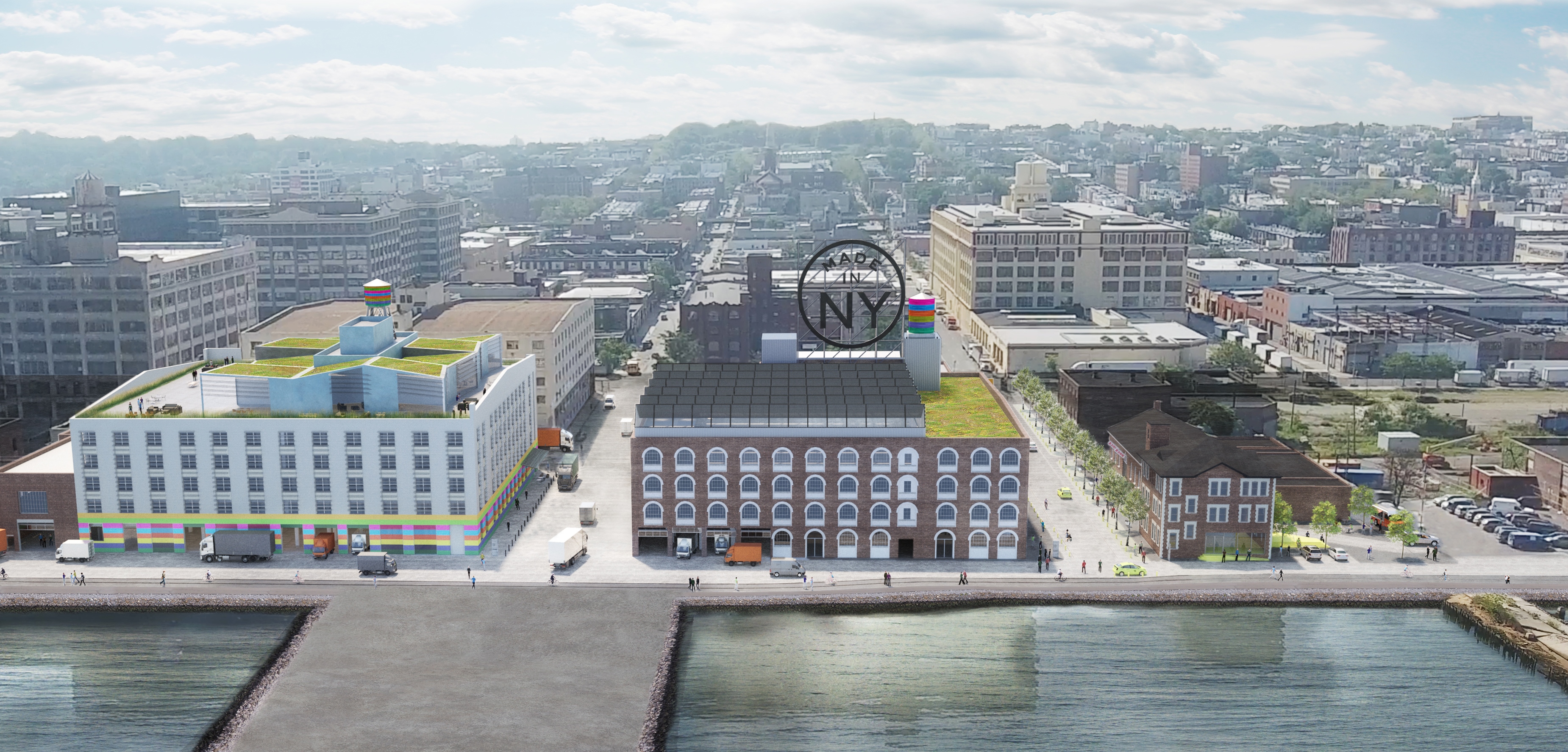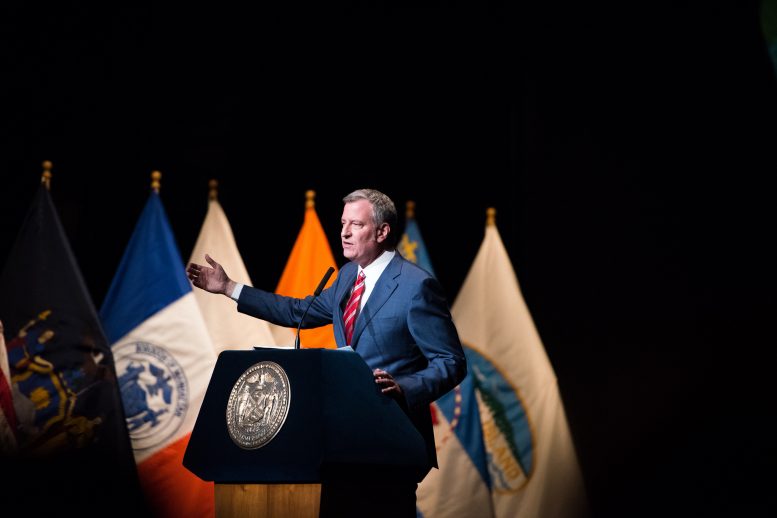In his State of the City speech last night, Mayor Bill de Blasio unveiled plans to increase affordable housing for low-income families, fund legal services for tenants facing eviction in housing court, and create a new manufacturing campus in Sunset Park.
“This affordability crisis threatens who we are. It threatens the very soul of this city,” said the mayor, speaking at the Apollo Theater in Harlem. He highlighted the need to create “good-paying” jobs that pay at least $50,000 a year. Then he proposed a broad plan to add 100,000 new jobs to the city over the decade.
The mayor announced two job-generating real estate initiatives. The city will invest $136 million to create a “Made in NY” manufacturing campus in Sunset Park, with companies that will offer fashion, food production, and TV and film jobs. The project involves redeveloping two former industrial buildings along the waterfront next to Bush Terminal Park, along First Avenue between 41st and 43rd Streets. The plan would create 1,500 permanent jobs and 243 temporary ones. Construction is expected to be begin next year and be complete by 2020.

Made in New York campus at Bush Terminal. rendering via NYC Mayor’s Office
He also promised $2.6 billion to retrofit public buildings, in an effort to reduce the city’s carbon footprint. The program would train 3,000 workers to do “green” construction work and efficient building maintenance in the next three years and “create or support” 30,000 jobs over the next ten years, according to the mayor’s office.
But housing—and its ability to lift people out of poverty—remained one of his key policy themes. Here are the three main housing and affordability initiatives the mayor discussed last night.
More Low Income Housing
The mayor’s original housing plan, rolled out in early 2015, aimed to build or preserve 200,000 units of affordable housing over the next decade. Twenty percent of those units, or 40,000, were promised for families who earn less than $40,800 annually. After affordable housing advocates claimed the mayor hadn’t focused enough on developing low-income housing, his office said last week that it would dedicate an additional $1.9 billion to creating and preserving apartments for New Yorkers who earn less than $40,000 a year.
With the extra funding, the city would ensure that 50,000 units—or 10,000 more than originally promised—would go to those needy households. Of those 10,000 apartments, 5,000 units would be reserved for seniors and 500 would go to veterans.
However, the mayor’s office hasn’t spelled out how many of those would be new construction units, versus preserved, rent-regulated apartments in older buildings.
Mansion Tax
In last week’s press release touting low income housing funding, City Hall also laid out its plan to levy a 2.5 percent tax on the sale of homes that cost $2 million or more. If passed this year, the policy would affect the top 4,500 residential transactions in New York City and generate $336 million in 2018, according to the mayor’s office. That money would be “lock-boxed”—or specifically reserved—for a new rental assistance program for seniors.
But the state legislature—which will have the final say over whether the tax becomes law—may oppose the measure. It’s not the first time the mayor has tried to tax pricey apartments. Two years ago, he floated a plan to tax homes that cost more than $1.7 million. Legislators ultimately rejected the proposal.
Right to Counsel for Tenants Facing Eviction
“While we make progress, we can’t keep losing ground to evictions,” the mayor said last night. “That’s why we’re going farther in providing counsel to people dealing with unscrupulous landlords.”
On Sunday, the city committed $93 million to fund legal services for all tenants facing evictions in housing court. New Yorkers who earn less than $50,000 a year would be guaranteed free legal representation while battling their landlord in court. Those earning more would be offered free legal counsel.
Free legal help would go a long way to curbing evictions in New York City, where 75 percent of tenants appear in housing court without an attorney. Since the city launched legal services for tenants in 2014, evictions have dropped 24 percent, according to a press release from City Hall.
Funding for the program will be phased in over the next five years, starting with $15 million in 2018. It will bolster the city’s current funding for tenant legal services, which is $62 million, and raise it to a total of $155 million by 2022.
The city estimates that legal services would help 400,000 New Yorkers a year once the program is fully implemented. It would save the city $320 million a year, according to a study from the New York City Bar Association. Evicted tenants often go straight into the shelter system, where it costs $43,222 to house a family for a year, the Bar Association found.
Subscribe to YIMBY’s daily e-mail
Follow YIMBYgram for real-time photo updates
Like YIMBY on Facebook
Follow YIMBY’s Twitter for the latest in YIMBYnews

